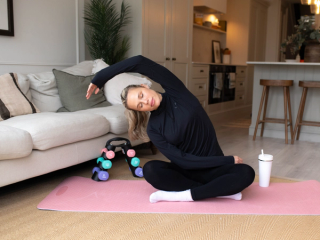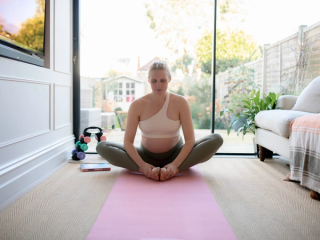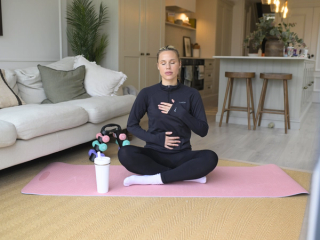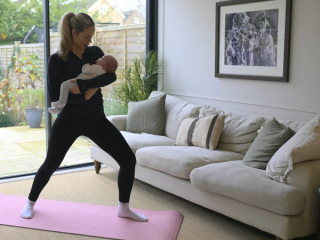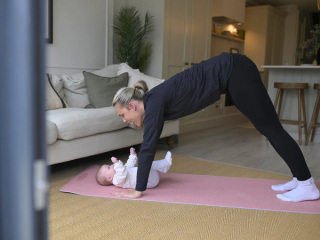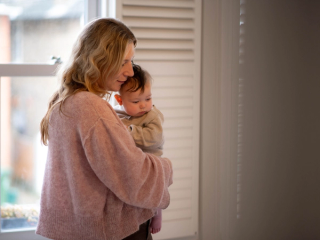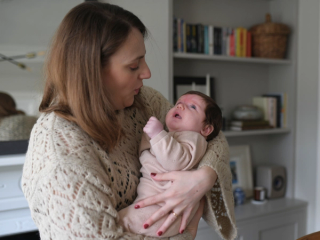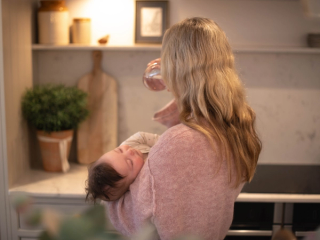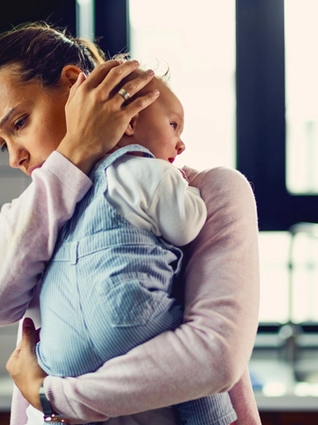
- Home
- Advice Hub
- Newborn
- Postnatal Care
- Postnatal Depression Symptoms
Postnatal Depression symptoms
Just like after any big life event, there is a natural knock on effect onto our emotions. Elinor, relationship therapist, shares the common signs and symptoms of Post Natal Depression.
Having a baby is a major life event. Perhaps you have been trying to conceive for a long time, and this baby is much loved before they have even arrived. For others, falling pregnant can be a bit of a shock, and it can take a while to adjust to the idea that in a few months there will be a baby. Whatever your circumstances, and whether this is baby number one, two or ten, it’s a big deal preparing for their arrival.
Just like after any big life event, there is a natural knock on effect onto our emotions. Feeling happy to meet your baby. Feeling relieved they are ok. Feeling anxious about being a ‘good enough’ parent. Couple all these new feelings with sleep deprivation, swollen breasts, postnatal bleeding and a heady cocktail of changing hormones, it makes sense that the ‘Baby Blues’ kick in for many people.
What are the Baby Blues and how are they different to Postnatal Depression?
For a start, the Baby Blues are very normal. Most women in the week after birth will report feeling overwhelming shifts in their emotions on various days. This is in part due to your dropping hormone levels, which were at an all time high during pregnancy, as well as all the other physical and emotional stresses of having your baby. Many women describe this as an emotional rollercoaster: one moment feeling delight and joy, and the next minute feeling tearful and doubting yourself.
Having support from a partner, close friend or family member is really helpful during this. Someone who can give you a hug, some reassurance, a listening ear and help you with some of the day to day things. Most women who experience these Baby Blues find that their mood stabilises a bit after around 1-2 weeks, and the highs and lows feel more manageable. They may start to feel more able to cope, to understand their baby’s needs and want to get out and about with baby.
Post Natal Depression, or PND, is different. Although the highs and lows of Baby Blues are very similar, with PND these might feel more extreme. You might find yourself doubting that you will ever be a good parent, and feeling overwhelmed by the demands of parenthood. Although with Baby Blues you can usually imagine feeling better one day, with PND it can feel that it surrounds you on all side and you can’t see a way forwards. You can’t see a light at the end of the tunnel, much like any other depression.
Common symptoms
Symptoms may include any of the following (you don’t have to be feeling depressed!):
- Feeling anxious, irritable or angry
- Feeling low, unhappy and tearful
- Not enjoying the things you used to
- Low energy and feeling exhausted
- Not being able to sleep
- Changes to your appetite
- Not wanting to be around other people
- Feeling guilty or shame
- Not feeling bonded to your baby
- Thoughts of suicide or self harm
PND usually begins in the first 2 weeks after birth but can occur at any stage and is often written off as ‘just Baby Blues’. As a result, for many women it can take months or even longer to get a diagnosis and help. The most important thing is, if you think there is a problem and that you might need help, being brave and trying to take steps to find that help. This can be difficult, as it’s common with PND to feel demotivated and helpless, but asking your midwife, health visitor or GP for some support is an essential, and usually straightforward, first step. It might also be important to listen to your loved ones if they are worried about you- it can sometimes be hard to notice things ourselves. The Royal College of Midwives estimate that 10-15% of women experience PND, so although it can be scary, you’re not alone and good treatment and support is available.
Once you’ve seen your GP and been diagnosed, you can start your journey to recovery. Sometimes this involves being prescribed anti-depressant medication, which can be beneficial to many people and help to lift your mood. However, don’t feel afraid to discuss any concerns you might have about taking anti-depressants, and what alternatives there are. Your GP may also refer you for Cognitive Behavioural Therapy, which is provided by the NHS and is an evidence-based therapy that helps many people improve their mood by changing the way that they think and the things that they do. If you don’t want to see your GP, you can self-refer for mental health support through the NHS here.
You may also find it beneficial to connect with others who have experienced PND. The PANDAs Foundation is a wonderful charity that supports anyone with perinatal mental ill health, birth trauma or PND, and offers a free helpline, WhatsApp support, Facebook groups and workshops.
Self help is also invaluable with tackling PND
Could you take a look at the suggestions below and try to fit one thing in each day?
- Talking to a friend, your partner or a family member can help you feel supported and less alone.
- Meeting up with another parent for a coffee
- Taking the buggy or using a baby carrier to go for a walk or to the park
- Finding a postnatal exercise class- yoga or pilates can be very beneficial
- Texting an old friend and arranging to meet up at a weekend
- Ask a family member to help you with the supermarket shopping
- Try a new baby group- the first session is often free and can be a fun way to bond
- Making time for a healthy lunch each day- eating regularly is important in your recovery
- What did you used to enjoy pre-baby? Can you find a way to introduce this in some way back into your life? For instance, if you’re a film fan, some cinemas hold baby friendly screenings. If you love reading, could you enjoy an audiobook while your baby is resting?
- Making time for rest – it’s not always easy to ‘sleep when the baby sleeps’ but could you allow yourself to close your eyes and put your feet up for 20 minutes during naptime?
The most important thing to remember is, no matter how hard it feels, it can and will get better. You won’t feel this way forever. Recognising the symptoms and asking for help is the first step in getting there. If you’re worried about your safety, or feeling like you can’t cope with life, you can contact Samaritans any time by calling 116 123 or emailing jo@samaritans.org .
As always, good luck, and I’d love to hear from you if you have any questions, via my website.
Elinor x
Advice & tips

Want to read more? Join the HiPP BabyClub for full access to this article.
As a BabyClub member, you'll get access to a range of exclusive benefits, including:
Monthly competitions
Discounts from our Partners
Expert advice tailored to your little one's age
Weaning recipes
HiPP shop discounts*
*10% off HiPP's online shop does not apply to our First Infant, Anti-Reflux or Comfort Formula Milk.
Important notice: Breastfeeding is best. Follow on milk should only be used as part of a mixed diet from 6 months. Talk to a healthcare professional.








